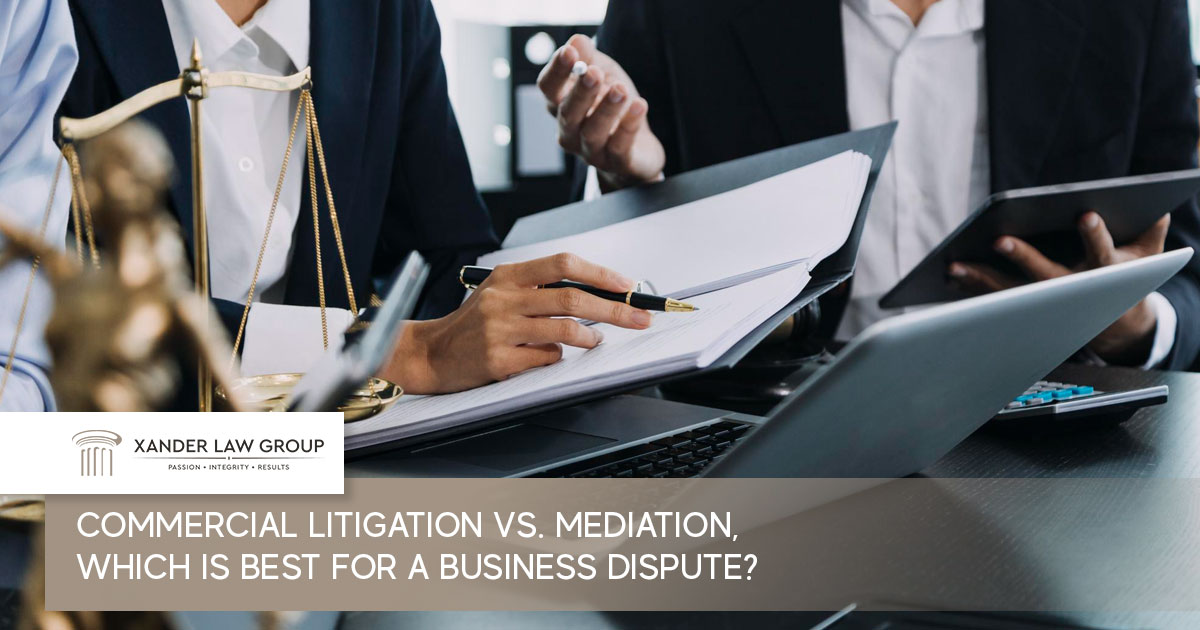Commercial Litigation vs. Mediation, Which Is Best For A Business Dispute?
Running a business in South Florida comes with many opportunities, but also the risk of unexpected legal disputes. When a conflict arises, companies need to think carefully about their next step. Should you take the matter to court through commercial litigation, or try to resolve it through mediation? Both options have pros and cons, depending on the type of dispute, what each party wants to achieve, and how much time, money, and energy you’re willing to invest.

What Is Commercial Litigation?
Commercial litigation is a legal process used to resolve business disputes. It usually involves a series of structured steps, including filing lawsuits, exchanging documents and information (known as discovery), taking depositions, and possibly going to trial. While litigation can provide a clear and enforceable resolution, it is often expensive and time-consuming. Legal fees, court costs, and more can add up quickly. In addition, the public nature of court proceedings may not be ideal for businesses looking to protect their reputation or keep sensitive matters confidential.
Benefits of Litigation:
- You gain access to the formal discovery process, which can be essential for gathering evidence.
- Outcomes are legally binding and enforceable by the court.
- You have the right to appeal if it is believed that a legal error has occurred.
- It may be the only viable option if the other party is acting in bad faith or refusing to negotiate.
Drawbacks of Litigation:
- It can be prohibitively expensive, with mounting legal fees, expert witness costs, and administrative expenses.
- Cases can take approximately a year or more to resolve.
- Court proceedings are public, potentially exposing your dispute and sensitive business details to competitors or the media.
- There is limited flexibility, as a judge or jury decides the outcome based on legal precedent, not business practicality.

What Is Mediation?
Mediation is a private, flexible, and less confrontational way for businesses to settle disputes. Instead of going to court, both sides sit down with a neutral third party—the mediator—who helps them talk through the issues and find common ground. The mediator doesn’t make a ruling or take sides but works to guide the conversation and encourage a solution that both parties can agree on.
While mediation is usually voluntary, in South Florida, courts often require businesses to try mediation before taking a case to trial. This is because judges recognize that mediation can be a faster, more efficient way to resolve many types of business disputes.
One of the biggest advantages of mediation is that it’s usually quicker and less expensive than going to court. It’s also private, which is important for companies that want to keep business matters confidential. Instead of leaving the outcome in the hands of a judge or jury, the parties maintain control over the result and can craft solutions that work specifically for their situation.
Benefits of Mediation:
- Mediation can be more cost-effective than litigation.
- It allows for quicker resolution, sometimes in a matter of weeks.
- Discussions remain confidential, protecting your business’s reputation and sensitive information.
- Parties have greater control over the outcome and can craft flexible, business-friendly solutions.
- It emphasizes a need for cooperation and is ideal when maintaining a working relationship with the other party is important.
Drawbacks of Mediation:
- Mediation is not legally binding or enforceable unless both parties sign a written settlement agreement.
- It relies heavily on both parties’ willingness to negotiate in good faith.
- There is no formal discovery process, so one party may feel disadvantaged if critical information is unavailable.
- If mediation fails, parties may still need to proceed with litigation, increasing time and costs.
Things To Keep in Mind As A Business Owner In South Florida
For your business, deciding between litigation and mediation comes down to your business’s practical and strategic considerations. Each option has its strengths, and the best choice depends on the specific circumstances of the dispute and what your business hopes to achieve.
If controlling costs and resolving the matter quickly are top priorities, mediation is often the better path. It tends to be far less expensive than litigation, with fewer legal fees and shorter timelines, often wrapping up in a matter of weeks or a few months, rather than dragging on for years. Mediation also keeps the details of your dispute private, which is especially important in South Florida’s highly competitive industries like real estate, tourism, healthcare, and international trade.
However, there are situations where litigation may be the smarter move. If the dispute involves a large amount of money, a clear breach of contract, or if it’s important to have a binding and enforceable court judgment, litigation offers more legal weight. It’s also more structured, which can be helpful when one party isn’t cooperating or when formal discovery tools, like subpoenas and depositions, are needed to gather key information that’s not being shared voluntarily.
Mediation works best when both sides are open to resolving the issue and want to maintain a working relationship. It allows for more flexible solutions that can be tailored to the unique needs of the involved parties. This is especially valuable in South Florida’s business environment, where personal relationships and adaptability often play a key role in long-term success.
In the end, the decision between litigation and mediation is about balance. You’ll want to weigh factors like cost, speed, confidentiality, enforceability, and the nature of your relationship with the other party. Choosing the right approach means understanding your business’s goals, the specifics of the dispute, and how best to move forward in a way that protects your interests.
Consulting With A Commercial Litigation Lawyer In South Florida
This just leaves one question: while you know you need an attorney during litigation, should you have a commercial litigation attorney during mediation?
The short answer is Yes! Having a commercial litigation attorney with you during mediation is often a smart move. While mediation is less formal than going to court, the issues at stake can still have serious financial and legal consequences. An experienced commercial litigation attorney can help you understand your legal rights, offer strategic guidance during negotiations, and ensure that any proposed settlement is fair and enforceable. They can also review or draft the final agreement to avoid vague terms that could lead to future problems. Additionally, having legal representation signals to the other side that you are well-prepared, which can increase your leverage. And if mediation doesn’t result in a resolution, your attorney will already be familiar with the case and ready to take the next step. Overall, having a knowledgeable attorney by your side ensures you’re protected and positioned for the best possible outcome.
If you’re facing a business dispute, consult with an experienced South Florida-based commercial litigation firm such as Xander Law Group. The right legal firm will help assess your unique situation and guide you toward the most strategic path forward, whether that means pursuing court action or resolving matters across the negotiating table.
Give us a call today at 305-767-2001 or use our online contact form, and a member of our team will be in touch to schedule a consultation.










